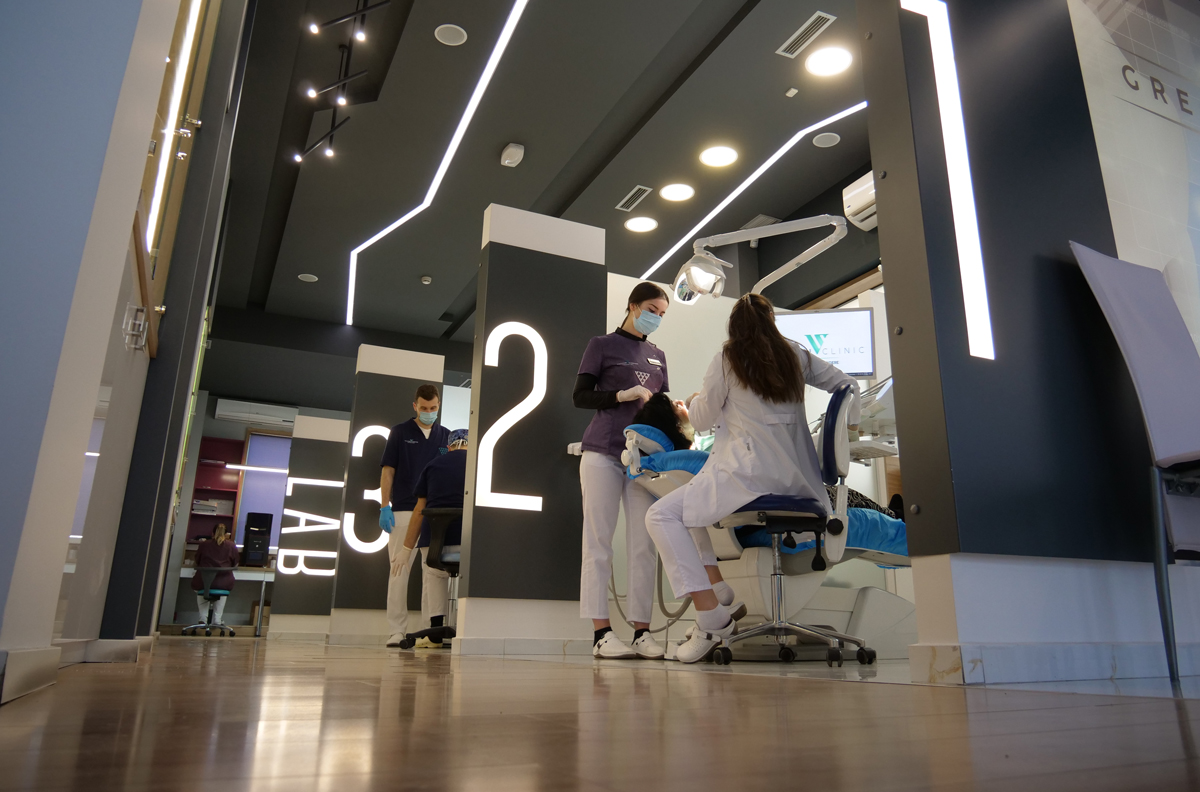WHY IT IS IMPORTANT TO HAVE A TEAM OF ASSISTANTS AND NURSES DURING YOUR IMPLANTOLOGY SURGERY

Those who read the Gremi Clinic Blog know that when undergoing dental surgery, abroad or in one’s own country, it is essential to make sure that several professionals are present, each with specific expertise.
We have already discussed the role of the Maxillofacial Surgeon, who specializes in bone reconstruction (HERE), and anesthesia and conscious sedation (HERE).
In this article, we will discuss, instead, the role and tasks of another professional figure whose presence is equally important: Clinic assistants (nurses, dental hygienists, chairside assistants) who take care of the patient from the moment they enter the Clinic until they return home and, again, in subsequent dental implant check-ups and maintenance.
Generally, in Low Cost Clinics, these figures are not present to save costs, but assistants perform priority tasks before, during and after any dental implant surgery, regardless of its complexity.
The clinic assistant is a paramedical figure who takes a prominent role for so many reasons: both psychologically and clinically. Let’s see why:
1. IT IS THE FIRST PERSON WHO MEETS THE PATIENT: THEIR POINT OF REFERENCE
The assistant is the figure who welcomes the patient from the moment they enter the Clinic, knows in depth their health condition and their state of mind with respect to the intervention, and is, therefore, a true light by the patient’s side, ready to accompany them at all stages of their journey.
From the moment the patient enters the Clinic, they are assisted while filling out the necessary forms and documents to prepare for the course of treatment. The assistant will have full control of his or her medical record and will assist the patient during all examinations and visits preparatory to surgery (3D CT scan, Digital Scan, orthopanoramic, blood draws, and so on).
In addition to the more organizational aspects, these figures also play an important role of emotional support and advocacy.
During the course, in fact, it is normal that the patient may experience doubts, questions, or may simply feel disoriented. Here, then, the clinic assistant plays a key role because he or she is always there to provide clarity and put the person at ease.
2. THE SMILE GUARDIAN: AN ATTENTIVE GUARDIAN DURING SURGERY AT THE SIDE OF THE SURGEON AND ANESTHESIOLOGIST
Like true guardians, assistants help surgeon and anesthesiologists throughout the implant surgery, taking care of:
- Preparing the workplace;
- Providing the necessary instruments and materials;
- Ensuring continuous care;
- Adopting hygienic and sanitary protocols;
In fact, in our Clinic, each surgery is performed in the presence of at least 5 assistants and, among them, there is always a nurse for everything related to patient care and treatment.
3. PATIENT CARE IN THE POSTOPERATIVE PHASE
In addition to being important in the preparatory and interventional phases, the role of the assistants continues and, indeed, perhaps becomes even more central to the patient from the end of surgery until the patient returns home. In Gremi Clinic, the assistants are responsible for accompanying the patient to his/her room and providing all the support needed for the most comfortable and shortest possible postoperative recovery.
The philosophy of Gremi Clinic is to put the well-being of our residents first and ensure that they have as little pain as possible. How? We make sure that ice is always available in our patients’ rooms; and that they all have pain relief therapies if needed. If this is not enough, the Clinic also provides “CERC treatment,” an innovative device used to completely nullify discomfort or possible swelling. This is a device used for training high-level athletes and which our Clinic makes available, completely free of charge, to patients most likely to feel pain. The machine is available within the Gremi Wellness Clinic located near our dental facilities.
The Clinic’s assistants are, therefore, in charge of assisting the patient with respect to all necessary dressings and treatments to ensure the shortest and painless course possible! In addition, of course, when in doubt, our patients can always refer to these figures.
